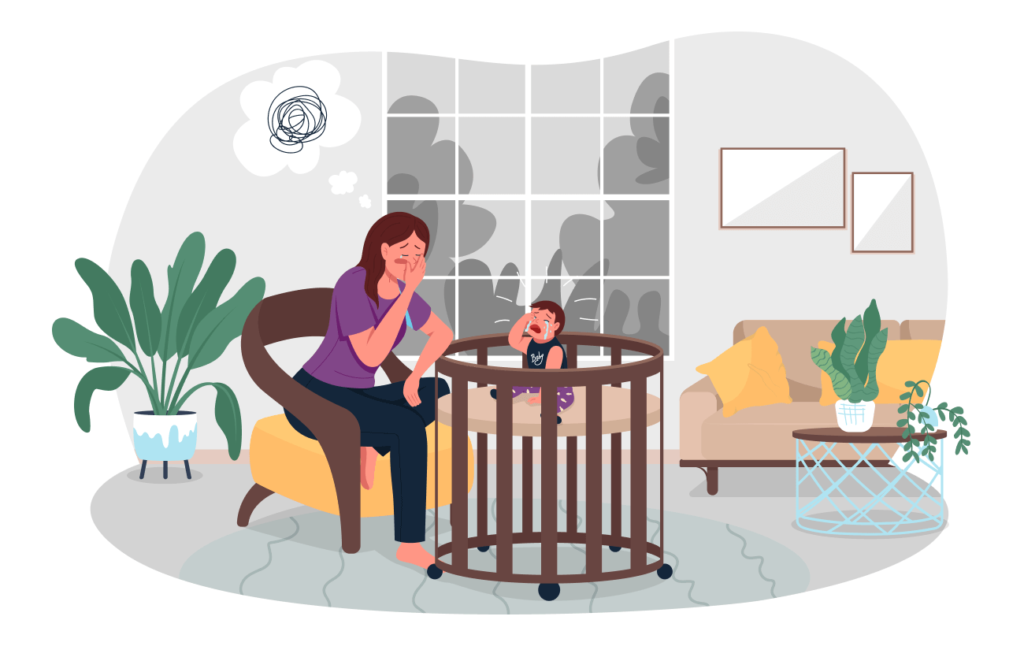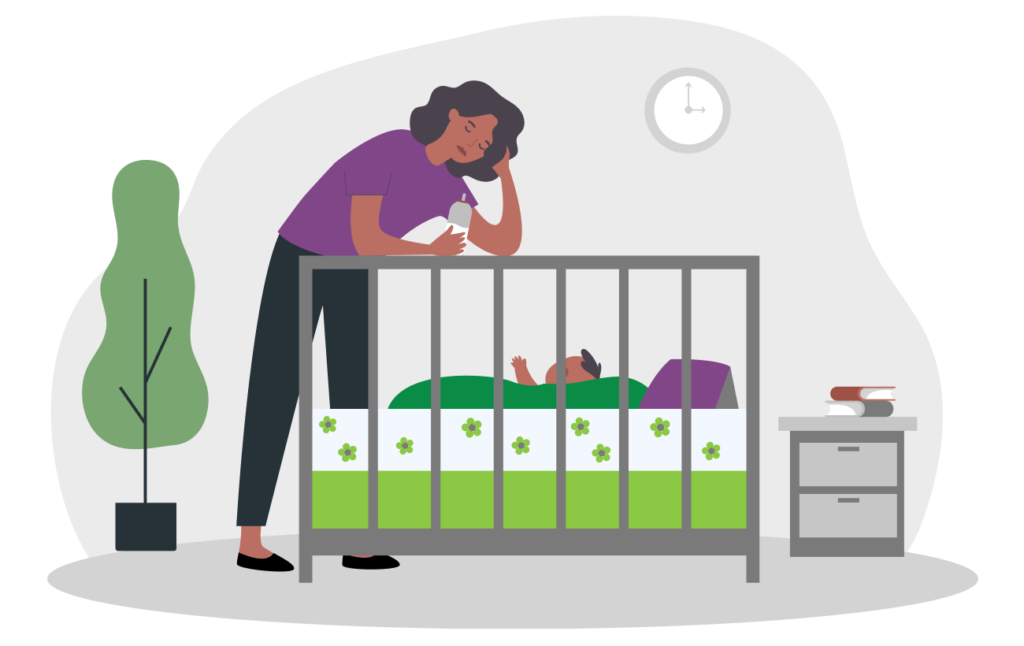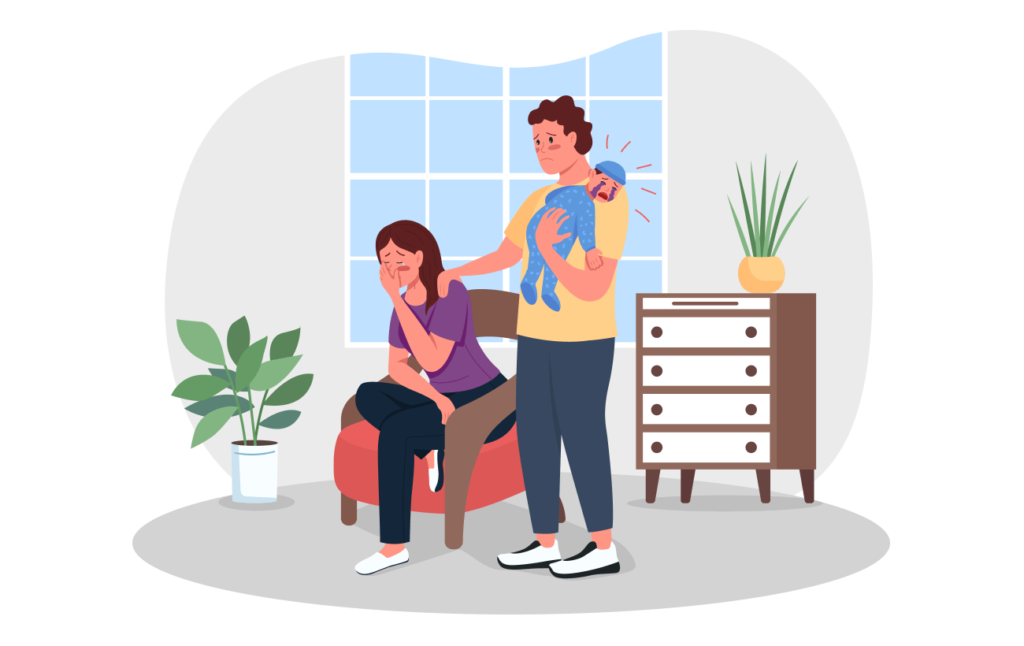Signs, symptoms, and help for moms with postpartum depression

Bringing a new baby home can be a momentous and joyous occasion. But not all new moms have feelings of happiness and hope. The sudden hormonal changes after delivery can cause anxiety, stress, isolation, fatigue, loss of appetite, and difficulty sleeping. In fact, about 80 percent of new mothers report feeling tearful and emotionally fragile for the first few weeks postpartum.
Feelings that last a few short days or weeks after a new baby is born are known as “baby blues.” These feelings are entirely normal, but what happens when they stick around longer? Postpartum depression (PPD), which affects about 1 in 7 women, rarely disappears on its own and can be dangerous for mothers and their children.
Sometimes the stress of labor, a genetic predisposition, memories of childhood, or expectations to “live up to” what society thinks motherhood should look like can increase the likelihood of postpartum depression and make you feel hopeless.
PPD and PPA (postpartum anxiety) can affect anyone regardless of your baby’s temperament. While postpartum depression may be mistaken for baby blues at first, the symptoms are more intense, last longer, and may eventually interfere with the ability to care for your baby and handle other daily tasks. Symptoms usually develop within the first few weeks after birth but can begin during pregnancy or surface up to a year after birth.

Postpartum depression symptoms may include:
- Depressed mood or severe mood swings
- Excessive crying
- Difficulty bonding with your baby
- Withdrawing from family and friends
- Loss of appetite or overeating
- Inability to sleep or sleeping too much
- Overwhelming fatigue or loss of energy
- Reduced interest and pleasure in activities you used to enjoy
- Intense irritability and anger
- Fear that you’re not a good mother
- Hopelessness or restlessness
- Feelings of worthlessness, shame, guilt, or inadequacy
- Diminished ability to think clearly, concentrate, or make decisions
- Severe anxiety and panic attacks
- Thoughts of harming yourself or your baby
- Recurrent thoughts of death or suicide
Symptoms of postpartum anxiety

Keep in mind that most (if not all) new parents experience some worry when bringing home a new baby. But the symptoms of postpartum anxiety include:
- Constant or near-constant worry that can’t be eased
- Feelings of dread about things you fear will happen
- Sleep disruption (mostly because of worry and anxiety and not related to the demands of caring for your baby)
- Racing thoughts
You can also have physical symptoms related to postpartum anxiety, like:
- Fatigue
- Heart palpitations
- Hyperventilation
- Sweating
- Nausea or vomiting
- Shakiness or trembling
It’s natural to worry, but sometimes it’s something more. If your anxiety seems unmanageable, you may have more than the new-parent jitters.
When to see a doctor

If you recognize you aren’t feeling like yourself and think you may have PPD or PPA, it’s time to get help. Call your doctor as soon as possible if your symptoms:
- Don’t fade after two weeks
- Are getting worse
- Make it hard for you to care for or enjoy your baby
- Make it hard to complete everyday tasks
- Include thoughts of harming yourself or your baby
Don’t be afraid to keep bringing up your symptoms if they don’t get better. The baby blues are common, but postpartum depression and postpartum anxiety are real and treatable. No one should have shame seeking assistance to feel better and enjoy this time of your life.
To speak to a CDPHP representative about all the mental health care services available to you, contact the CDPHP Behavioral Health Access Center at 1 (888) 320-9584. If you are in a life-threatening situation, call the National Suicide Prevention Lifeline at 1 (800) 273-8255.
*aptihealth is available to CDPHP members who are 5 years of age and older, a New York State resident, and possess an email address and video-enabled smartphone or computer. Some employers who self-insure may not have this benefit. If you are unsure if your plan includes this benefit, please contact CDPHP member services.
 The Daily Dose
The Daily Dose
Comments are closed.